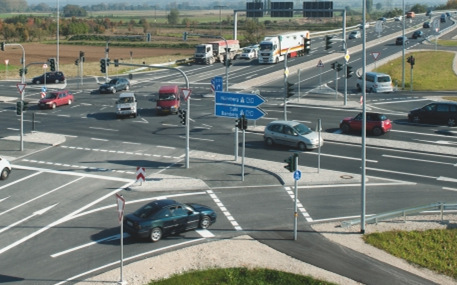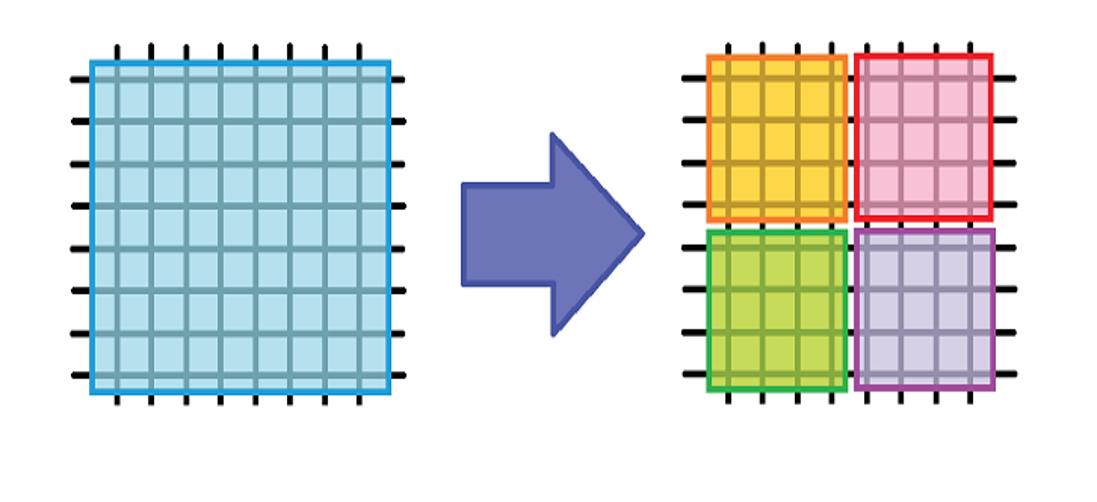Urban Traffic Signal Scheduling
 |
Distributed Adaptive Urban Traffic Signal Control based on V2X Information Infrastructure Research Project in NTU-NXP Corp Lab |
Summary
Traffic congestion has become one of the major challenges for metropolitan growth. In addition, the waste exhaustion from massive vehicles trapped on the road also imposes environmental issues, which, for example, have caused significant social and health problems in China. In this project we will investigate how to improve traffic situations in a densely populated region by using intelligent traffic control with Vehicle-to-infrastructure (V2X) information technologies. In the first stage of research, we aim to develop a distributed traffic-responsive scheduling architecture for urban traffic signal control, which consists of a set of local processing centres running in parallel that communicate with each other for neighboring traffic information to refine their own local traffic signals. It takes real-time traffic measurements via road sensors and/or V2X communication infrastructure, estimates vehicle driving patterns (such as speeds, turning ratios and link densities), and generates the corresponding green time schedule for each junction aiming for minimizing the network-wise total waiting time. To deal with traffic uncertainties, a model-predictive strategy will be adopted. In the second stage, synthesized traffic-responsive traffic light schedules and the corresponding predicted link speeds are sent back to individual vehicles via V2X, which affect vehicles future route plans. Such updated route plans will be fed back to the traffic light control centers via V2X to enhance existing traffic light schedules. Our ultimate goal is to form a closed loop between traffic light schedulers and traffic signal end users (i.e., vehicles), whose joint efforts will eventually lead to an intelligent and highly adaptive road traffic management system.
Project Objectives
Real-time traffic signal scheduling
Distributed architecture
Receding horizon strategy
Real-time model identification
Information collection via V2X
Machine learning for model validation
Holistic traffic signal scheduling
Traffic scheduler to drivers - route planning
Drivers to traffic scheduler - road usage
Research Topics
 |
|
 |
|
Collaborators
Prof. Rong Su (PI), Dr. Yang Su, Dr. Kaizhou Gao, Dr. Ali Sadollah, Dr. Bohui Wang, Dr. Yi Zhang, Dr. Antonis Lentzakis, Mr. Chunyang Sun.
Publications
K. Gao, Y. Zhang, R. Su, F. Yang, P. N. Suganthan and M. Zhou. Solving Traffic Signal Scheduling Problems in Heterogeneous Traffic Network by Using Meta-Heuristics. IEEE Transactions on Intelligent Transportation Systems. Sep 2018.
A. Sadollah, K. Gao, Y. Zhang, Y. Zhang and R. Su. Management of traffic congestion in adaptive traffic signals using a novel classification-based approach. Engineering Optimization. Aug 2018.
K. Gao, Y. Zhang, Y. Zhang, R. Su and P. N. Suganthan. Meta-heuristics for Bi-objective Urban Traffic Light Scheduling Problems. IEEE Transactions on Intelligent Transportation Systems. Jul 2018.
Y. Zhang, K. Gao, Y. Zhang and R. Su. Traffic Light Scheduling for Pedestrian-Vehicle Mixed-Flow Networks. IEEE Transactions on Intelligent Transportation Systems. Jun 2018.
Y. Zhang, R. Su and Y. Zhang. A macroscopic propagation model for bidirectional pedestrian flows on signalized crosswalks. 56th IEEE Conference on Decision and Control (CDC’17), 2017.
Y. Zhang, R. Su, Y. Zhang and C. Sun. Modelling and Traffic Signal Control of Heterogeneous Traffic Systems. arXiv, 2017.
Y. Zhang, R. Su, K. Gao and Y. Zhang. A pedestrian hopping model and traffic light scheduling for pedestrian-vehicle mixed-flow networks. arXiv, 2017.
Y. Zhang, R. Su, C. Sun and Y. Zhang. Modelling and Traffic Signal Control of a Heterogeneous Traffic Network with Signalized and Non-Signalized Intersections. 1st IEEE Conference on Control Technology and Applications (CCTA’17), 2017.
Y. Zhang, R. Su, K. Gao and Y. Zhang. Traffic Light Scheduling for Pedestrians and Vehicles. 1st IEEE Conference on Control Technology and Applications (CCTA’17), 2017.
K. Gao, Y. Zhang, Y. Zhang and R. Su. A Meta-heuristic with Ensemble of Local Search Operators for Urban Traffic Light Optimization. The 2017 IEEE Symposium Series on Computational Intelligence (IEEE SSCI 2017), Honolulu, Hawaii, USA, 2017.
K. Gao, Y. Zhang, A. Sadollah, R. Su and A. Lentzakis. Jaya, harmony search and water cycle algorithms for solving large-scale real-life urban traffic light scheduling problem. Swarm and Evolutionary Computation, 2017.
K. Gao, Y. Zhang, A. Sadollah and R. Su. Improved artificial bee colony algorithm for solving urban traffic light scheduling problem. IEEE Congress on Evolutionary Computation 2017, Donostia/San Sebastian, 2017.
K. Gao, Y. Zhang, A. Sadollah and R. Su. Optimizing urban traffic light scheduling problem using harmony search with ensemble of local search. Applied Soft Computing 48 (2016): 359-372.
K. Gao, Y. Zhang, A. Sadollah and R. Su. Java Algorithm for Solving Urban Traffic Signal Control Problem. 14th International Conference on Control, Automation, Robotics and Vision, 2016.
K. Gao, A. Sadollah, Y. Zhang and R. Su. Discrete Jaya Algorithm for Flexible Job Shop Scheduling Problem with New Job Insertion. 14th International Conference on Control, Automation, Robotics and Vision, 2016.
K. Gao, Y. Zhang, R. Su and A. Lentzakis. Discrete Harmony Search Algorithm for Solving Urban Traffic Light Scheduling Problem. 2016 American Control Conference (ACC’16),2016.
Y. Zhang, R. Su and K. Gao. Urban Road Traffic Light Real-Time Scheduling. 54th IEEE Conference on Decision and Control (CDC’15), 2015.
Y. Zhang, Y. Su and R. Su. Real-Time Scheduling in Urban Road Traffic Light Control. 14th Asian Pacific Intelligent Transportation System Conference, 2015